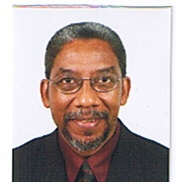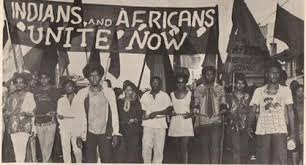 February 26, 1970, a solidarity march in support of Caribbean students on trial in Canada on charges arising out of protest actions, began in Port of Spain. For almost 3 months this spark escalated into a raging fire of mass protest across the country which became known as the Black Power Movement or the ’70 Revolution. While support of the students was the immediate issue, there were deeper concerns which were the real catalyst. After 8 years of formal Independence, the youth of the country became the spear of a seething discontent. There was widespread disappointment in the promises of Independence. The biggest signs of the emptiness of the “massah day done” rhetoric were the continued domination of the economy by foreign ownership and the lack of opportunities for vast majority of the successors of the chattel slaves and bound indentures. Visibly, in the employ of the banks and other institutions, the faces did not reflect or represent the majority of the society. The outward-and-visible signs of an inward-and-fundamental malaise encourage the perception that the problem was race. It is recorded that the newspapers of the day dubbed the growing protest movement – Black Power. February 26 – A Continuation There was an international context:
When the solidarity demonstration began outside the Canadian Embassy on South Quay and moved to the Canadian banks and eventually the Catholic Cathedral, this was indeed a continuation, a mushrooming of several seeds planted in the previous year or more. The bus workers’ strike, the organizing of the youth mostly in the urban communities, the arrest and charging of the students in Canada, the UWI students blockade of the Canadian High Commissioner were all strands of the growing discontent. The formation of the National Joint Action Committee on February 26, 1969, harnessed them all into a coalition of forces demanding Change. A united front of workers, farmers, students, youth, women and other collectives of the people was forged. Their demands were economic, social, cultural and political. “We do not want the crumbs, we want the whole bread!” was a call for the end of foreign domination and control of the economy and for the wealth generated by the economy to be used to provide for the needs of the population above all. The most prominent banner “Indians and Africans, Now!” signaled the desire for Unity of the People. “Power to the People!” pointed the political demand for decision-making power. Out of the cathedral protest, nine NJAC members were arrested. In response, daily demonstrations escalated, the largest of an estimated 50-100,000 marchers on April 6 in the funeral of Basil Davis, a protestor killed by the police. The threat of national strike flowed from a sugar workers’ strike. Protests were held in Tobago and the March to Caroni was also a highpoint. This movement sustained for almost 2 full months until the arrest of 15 leaders and declaration of a State of Emergency on April 21. This suppression sparked mutiny in the ranks of the Regiment. Value of the Revo Today, some people question the value of the 1970 Revo. Some are cynical that anything useful has come out of it. Others are skeptical that even if there was advance, that our politics remains stagnated in a pre-70 mold. This powerful mass movement of 1970 did bring developments in various areas. Most importantly, it was an awakening for the nation. No one who lived through those times, remained unaffected. How they were affected and responded to these unprecedented developments depended on their position in the social structure and their involvement in the events. Large numbers of people began to question the state of things. The necessity for this collective action became so much clearer to growing numbers. For many, 1970 drew them to commitment to the development of the nation, to the interests of the people and to the cause of progress and political advance for our nation. The spread of social consciousness was enormous, and its benefit is felt to this day. 1970 also constituted a magnificent cultural renaissance for our nation. On the economic level, the state’s response was to try and address the face of things with a rash of nationalizations which have expanded the state sector. There were also adjustments in the employment policies of the big finance houses and opportunities did open up in many areas for locals. Any real redistribution of wealth in favour of those who demanded ‘the whole bread’ has not happened. At best, the quantity of ‘the crumbs’ has increased. The ‘commanding heights of the economy remains out of the hands of the people. However, what is now popularly referred to as the 1% remains firmly in ownership and control of the economic pie and foreign interests in the major oil and gas sector still dominate. The political structure has changed very minimally, Republicanism to remove the “queen face” as Head of State notwithstanding. Our governance institutions remain essentially those inherited from the ‘Crown colony Governorship’. The majority are still not yet in control of our society. The minority continues to rule. The value of 1970 is that the Necessity For Change which was recognized, whether perceived as to change on the surface or more fundamentally for the reconfiguration of the economic, political and social order, remains a motivating force for those who are committed to the real historic development of our society in the interest of the people. Despite the setbacks and reversals, today, on a much larger social scale those who refuse to accept the status quo and who question the causes of our condition; who demand solution to the state of our social and natural environments are; who want a new governance with power to the majority and a new political process which gives decision-making power and sovereignty to those who constitute our nation; are active, even if appearing dormant. The social forces that constituted the coalition within NJAC and in action on the streets are all present, more conscious and need to organize. The aims of the 1970 Revo remain to be fulfilled and the forces to achieve it are present. That day of victory will come. The leadership must be constituted. Clyde Weatherhead 26 February 2018
ROBERT M. HISLOP
2/3/2018 01:45:46 am
Veru comprehensive indeed...
Josanne leonard
2/3/2018 05:18:37 pm
Clyde, thanks for this sober reflection on the events, local and global, leading up to and post February 26, 1970. Regardless on what side of history, politics or ideology (where it may exist) stand, one fact is indisputable....our beloved country and region remain in a state of arrested development. Unless we as a people and country challenge ourselves to create a new and more humane social, intellectual and cultural order, we will not solve crime, unemployment or economic problems. 1970 posited many lessons and created a different and positive ethos. While the slogan is not Black Power, the mission is the same. Thanks for this, One love. Comments are closed.
|
AuthorI am a appalled at the loss of the simple skills of discussing ideas and sharing Opinions to DEEPEN ANALYSIS and UNDERSTAND DEVELOPMENTS to ARRIVE AT SOLUTIONS. Archives
April 2024
Categories |

About Clyde Weatherhead
Clyde has been involved in public life as a political activist, a trade unionist, Lawyer, Teacher and Author |
Connect With Clyde
Write to Clyde on Facebook Visit Clyde's Author Page on Amazon Go To Discussion on Facebook For Employment Relations Issues |


 RSS Feed
RSS Feed